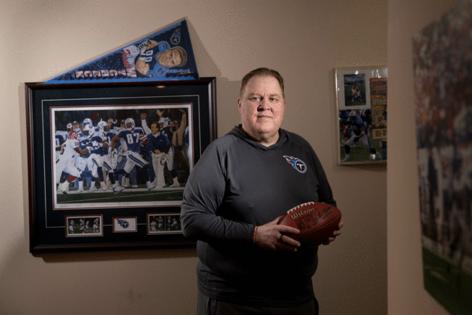Frank Wycheck found to have Stage 3 CTE, his family announces
Published in Football
PHILADELPHIA — Frank Wycheck was right: His brain had been ravaged by football.
Researchers at Boston University’s Chronic Traumatic Encephalopathy Center have determined that the onetime NFL star and Northeast Philadelphia native, who died at age 52 in December 2023, had Stage 3 of the degenerative brain disease, Wycheck’s family announced Thursday.
The former tight end had once said that he suffered at least 25 concussions during his playing career. He struggled to find stability in his life after he retired, often telling his daughter, Madison, that it “felt like his brain had a thick brick wall inside that stopped his will to follow through with anything.”
Many former athletes who have CTE are plagued by memory loss, depression, and mood swings.
Wycheck died after falling at his home in Chattanooga, Tenn. He was 20 years removed from his final NFL game.
“If one thing could come of this diagnosis, I pray that families all over the world would consider my dad’s story as a cautionary tale regarding the long-term consequences of repetitive brain trauma in athletes and to carefully think about their careers in professional contact sports,” Madison Wycheck Nowell said in an email statement.
“This is a disease that began affecting my dad very early in his life, and I believe played a significant part in taking him way too soon. My hope is that with increased awareness, research, and advocacy for player safety, we can help fellow families of minor and professional athletes continue to thrive, not only during their careers, but after playing the sport they love so they can continue to share their legacies with generations to come.”
Earlier this year, a survey of nearly 2,000 former NFL players, conducted by the Harvard University Football Players Health Study, found that 34% of the former athletes believed that they had CTE.
After football
Wycheck was a larger-than-life star in the 1980s at Archbishop Ryan High before playing at the University of Maryland. The son of a Philly cop, Wycheck was drafted in the sixth round in 1993 by Washington, but his career quickly fizzled. The Houston Oilers, who later became the Tennessee Titans, claimed Wycheck on waivers for $100. His career had new life.
Wycheck played nine seasons with his new team, made three Pro Bowls, and threw the lateral pass on Jan. 8, 2000, that became known as the Music City Miracle. Wycheck’s family announced his CTE diagnosis a day after the 25th anniversary of their father’s greatest moment.
“After my father’s retirement from professional football, our family faced challenges in understanding the physical and mental changes he was experiencing,” his daughter, Deanna Wycheck Szabo, said in the email statement. “We initially believed it was simply an inability to adjust to ‘normal’ life after the intensity of being a professional athlete. We witnessed our father becoming increasingly isolated and experiencing drastic mood swings. He became more impulsive and often inconsistent and undependable.
“At the time, I mistakenly attributed his struggles to missing the spotlight and camaraderie of his playing days. But now in hindsight, I understand that he was suffering from the symptoms of CTE due to the repeated trauma his brain and body endured over 11 seasons in the NFL. My father put his body on the line throughout his career. He loved the game, and even more so loved his teammates. After retirement, he fought for years to bring light to his post-NFL journey and the fears he had around his struggles and symptoms that he knew wholeheartedly was CTE. He often felt forgotten and ignored and that his situation was helpless.”
Early signs
Wycheck said freely after his NFL career that he believed he had CTE. In a 2017 interview with ESPN, he said that he worried he would “snap” one day. He had a prominent gig hosting a popular Nashville sports-radio show before abruptly walking away that summer.
He told those close to him about his struggles with migraines, memory loss, anxiety and depression. But despite his hardships, Wycheck often said he wouldn’t change anything about his career.
“Reflecting back, I wish our family had been educated on the signs and symptoms of CTE,” Deanna Wycheck Szabo said. “Instead of believing that something was inherently wrong with him, we now know he was doing the best he could as a father and friend under circumstances beyond his control.
“Our family is grateful to learn of his confirmed CTE diagnosis in hopes to continue our father’s desire to bring awareness, increased intervention, education, and support for NFL alumni and their families related to CTE. Our hope is that NFL alumni who believe they are suffering from CTE will be given the much-needed resources and guidance prior to their symptoms reaching a debilitating state. With ongoing CTE research and diagnosis, we hope future NFL alumni and families will be explicitly given an outline and plan of action in receiving care and treatment. That’s what our father would have wanted.”
———
Staff writer David Gambacorta contributed to this article.
©2025 The Philadelphia Inquirer. Visit inquirer.com. Distributed by Tribune Content Agency, LLC.










Comments